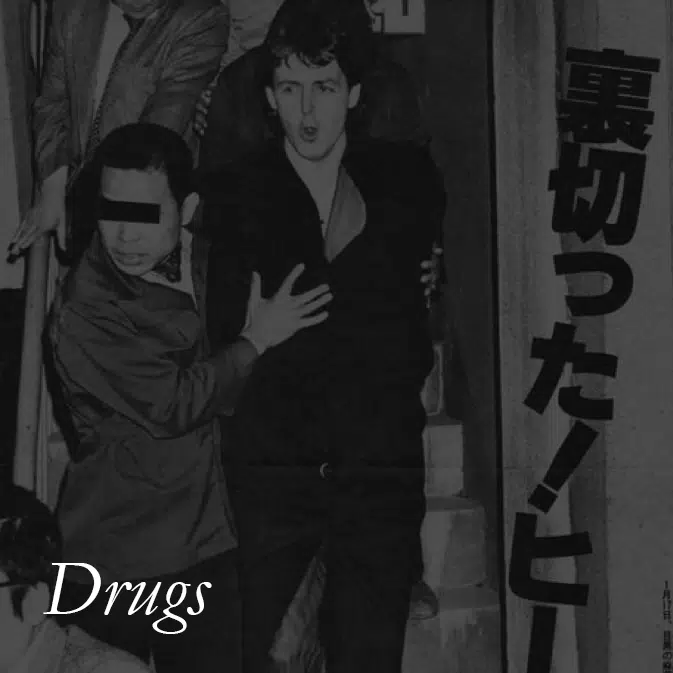
June 16, 1967
Paul McCartney says he’s taking LSD
Last updated on May 10, 2024

June 16, 1967
Last updated on May 10, 2024
Previous article Jun 07, 1967 • A newspaper story inspires John Lennon to write "Mean Mr. Mustard"
Session Jun 14, 1967 • Recording "All You Need Is Love" #1
Article June 16, 1967 • Paul McCartney says he's taking LSD
Interview Jun 16, 1967 • The Beatles interview for Life Magazine
Article June 17-22, 1967 • Mike Vickers writes the orchestra arrangement for "All You Need Is Love"
On June 16, 1967, Life Magazine, in the US, published an article where Paul McCartney is quoted saying:
After I took [LSD], it opened my eyes. We only use one-tenth of our brain. Just think what all we could accomplish if we could only tap that hidden part! It would mean a whole new world. If the politicians would take LSD. there wouldn’t be any more war, or poverty or famine.
Paul McCartney – Interview with LIFE Magazine, June 16, 1967
The UK press immediately seized upon it, and three days later, Paul gave a statement to Independent Television News (ITN).
Another article was published on July 19, 1967, in the UK Queen Magazine, where Paul McCartney once again mentioned LSD. This article led Miss Alice Bacon, Minister of State at the UK Home Office, to declare she was “horrified” at the views of Paul McCartney on drugs and reiterate the UK government’s commitment to stopping drugs from spreading.
The Beatles’ involvement with drugs has been massively exaggerated over the years, but they certainly experimented more than most people. It was Paul who first admitted the truth to the Press in a very unscheduled interview which I tried hard to interrupt.
I had been asked round to see Paul at Cavendish Avenue, but when I arrived the security gates were firmly shut and I couldn’t raise an answer on the security intercom. But I knew Paul was in because I could hear his voice. I was forced to resort to climbing over the wall. Not very dignified for a smart-suited executive, I know. But, hey, this is the crazy music business. I scrambled down inside the large and elegant gardens and, to my horror, I heard Paul cheerfully confessing to using marijuana because he found it so relaxing. My heart sank into my shiny shoes when I realised the guy he was talking to was a reporter. With as much confidence and authority as I could muster, which was pretty well zero, I tried to interrupt this impromptu press conference which I was convinced was instantly going to burst the bubble of popularity the Beatles had inflated.
‘Er, Paul,’ I bumbled, ‘could I have a word?’
‘It’s OK, Al. It’s cool,’ said Paul without removing the easy grin from his face.
‘But, I’m not sure that Brian would …’
‘It’s OK, Al. Relax. It’s time the truth came out.’
I was horrified, because at this time there had been accusations and colourful stories and all the rest of it but none of the Beatles had stood up and admitted that they used illegal drugs. Paul clearly thought the time for this hypocrisy was over and the reporter’s notebook was by now twitching nervously in case this scoop was going to be snatched away from him. Paul introduced me to the reporter and told me to relax and carried on telling the world how much the Beatles enjoyed smoking cannabis. It did create a storm but the Beatles weathered it easily and I came to realise the extent of Paul’s talent for public relations. He hadn’t talked to Brian or the other three before going public. And for all the notice he took of my nervous warnings, I might as well have stayed on the other side of the wall.
Alistair Taylor – From “With the Beatles: A Stunning Insight by The Man who was with the Band Every Step of the Way“, 2011
Brian, too, was besieged with phone calls from reporters at his Chapel Street house. It was too late to issue a denial or to say it was a misunderstanding, as he had done in America about John’s “Jesus” remarks, so Brian well-meaningly did the worst thing possible. He admitted that he, too, took LSD and that he saw nothing wrong with it. “There is a new mood in this country re LSD,” he told reporters. “I am wholeheartedly on its side.” To Melody Maker, the teen music paper, he gave a more lengthy interview in which he said, “I did have some apprehension, but I took that risk. I think LSD helped me to know myself better, and I think it helped me to become less bad tempered.”
With this, all hell broke loose. Brian was widely criticized in newspaper editorials, TV commentaries, and by parent and church groups for his confession. It was discussed at length on the floor of Parliament, and the Home Office issued an official statement saying it was “horrified” at Epstein’s attitude toward this dangerous drug.
Paul himself was the least grateful for Brian’s compounding his mistake. Phone calls between them shot back and forth, until they became so abusive in tone that Brian stopped taking Paul’s calls, and then he would sulk about guiltily for not having dealt with the problem.
From “The Love You Make: An Insider’s Story of the Beatles” by Peter Brown and Steven Gaines, 2002
I was the last in the group to take LSD. John and George had urged me to do it so that I could be on the same level as them. I was very reluctant because I’m actually quite strait-laced, and I’d heard that if you took LSD you would never be the same again. I wasn’t sure I wanted that. I wasn’t sure that was such a terrific idea. So I was very resistant. In the end I did give in and take LSD one night with John.
I was pretty lucky on the LSD front, in that it didn’t screw things up too badly. There was a scary element to it, of course. The really scary element was that when you wanted it to stop, it wouldn’t. You’d say, “Okay, that’s enough, party’s over,” and it would say, “No it isn’t.” So you would have to go to bed seeing things.
Around that time, when I closed my eyes, instead of there being blackness there was a little blue hole. It was as if something needed patching. I always had the feeling that if I could go up to it and look through, there would be an answer. The most important influence here was not even the metaphysical idea of a hole, but this absolutely physical phenomenon — something that first appeared after I took acid. I still see it occasionally, and I know exactly what it is. I know exactly what size it is.
Paul McCartney – From “The Lyrics: 1956 to the Present“, 2021
LSD: Mirror doctor raps Beatles Paul
BEATLE Paul McCartney admitted last night that he has experimented several times recently with the drug LSD.
At his home in St. Johns Wood — on the day before his twenty-fifth birthday — he said: “One of the reasons I am telling you this is that my experiences with LSD have made me a much more honest person. I find it very difficult now to tell a lie.”
But last night the Sunday Mirror doctor emphasised that LSD should be used only under professional supervision, and where it was necessary for a patient’s well-being.
Said Paul: “I have taken LSD four times. I became interested because here I am not 25 years old yet, I have made a lot of money, I’m famous you would think I have got it made. But I realised there was something else. Well, anyway, I had heard about drugs and I saw that a number of people in show businesspeople I looked up to and respected — were on drugs of some kind.
“So I thought: ‘If these people dabble in drugs, who am I to write the whole thing off?’ At one time, say when I was eighteen, I would have thought that what I have now would be the height of my ambition. But it isn’t, by a long shot. I don’t know exactly what I’m still after, but when you get a man with millions saying he just feels lonely, you don’t laugh.
“I had read a lot about LSD and finally I decided to try it. It was right here in this room. Each session lasted about six hours. It was the experience in my mind, and if you like, my soul, that was the shattering thing. I simply cannot explain what the experience was. It was different each time, and yet in a way it was always the same. All I can say is that it has shown me that there is something more to life than I have experienced before, call it love or God or what you will.
“But — and I want to make this very clear — I do not advocate the use of LSD or any drug for anybody else. I have no idea what effect it could have on someone else. I only know what it does to me. I regard it as a purely personal thing. I would rather not have talked about it at all, but now that the subject has come up and I am asked a direct question I find it impossible to lie about this thing. One thing I’m quite sure of is that LSD is definitely not addictive. I am not a junkie or anything like that. I have no intention of messing about with all kinds of drugs to see what they will do to me.”
But last night the Sunday Mirror doctor insisted: “This is a dangerous thing to play with and it is not for Paul McCartney to say it is or is not addictive. There is not only a danger of increasing tolerance, but a terrible risk of personality changes of a lasting character. Used properly and in skilled hands, LSD can still have dangers, but can also bring benefits. But no one can play with fire and expect to avoid burning. It is a great pity that someone of this popularity should be associated with drug-taking of this kind. Anyone who takes LSD except under proper medical or psychiatric supervision is asking for terrible trouble. It should NEVER be so used by ANYONE.”
From Daily Mirror – June 18, 1967
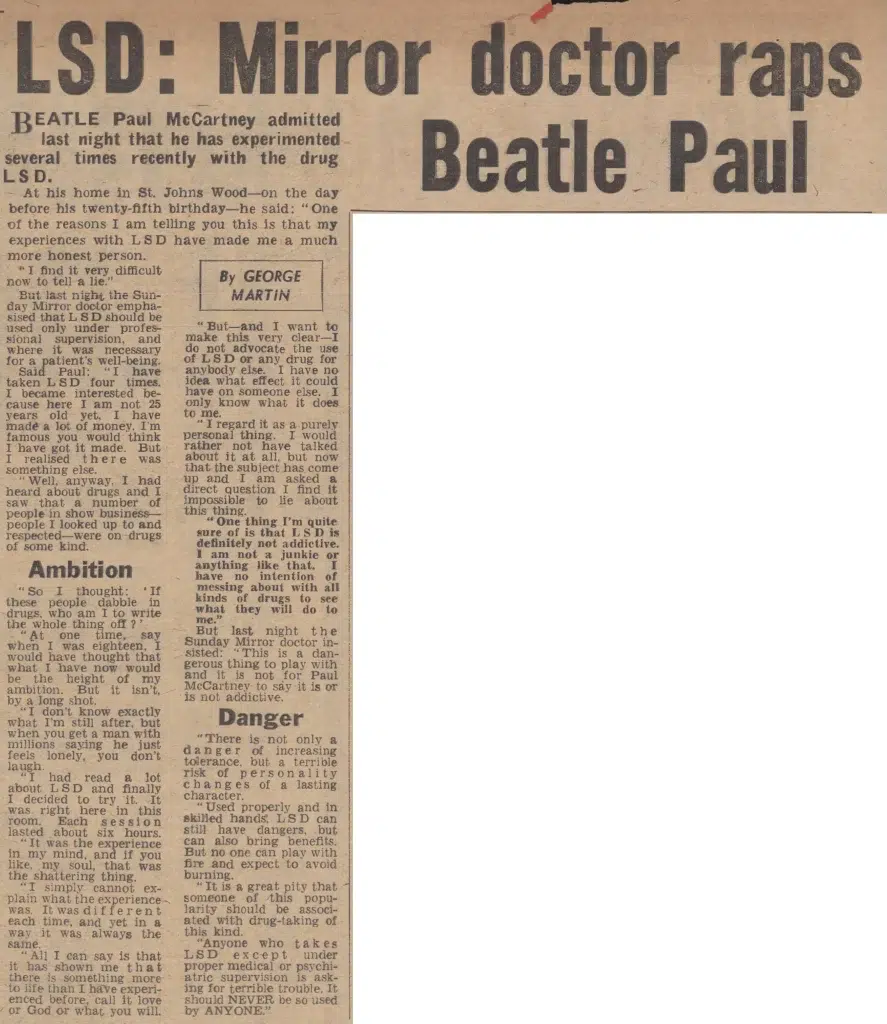
A SILLY BEATLE
BEATLE Paul McCartney, twenty-five yesterday, is one of the oldest teenagers on record. At the moment, he is not behaving like a teenager — even an elderly one. He is behaving like an irresponsible idiot. He confesses publicly to having taken the hallucination drug LSD. He says “maybe” he might take it again. He talks about this dangerous drug in such glowing terms that, despite his statements to the contrary, you might well think he was recommending LSD to all his teenage fans — and, indeed, to the whole world.
Perhaps millionaire McCartney ought to see a psychiatrist who will explain just why LSD is regarded as a dangerous drug. Perhaps he ought to see a psychiatrist anyway. Perhaps Mr. McCartney ought also to consult a lawyer who will tell him that it is an offence to be in unauthorised possession of LSD.
This mixed-up Beatle may protest that he doesn’t advocate LSD for anybody else, and that he doesn’t want his fans to take it. But he must know his own influence. By talking so enthusiastically about LSD, isn’t he encouraging his fans to break the law by being in possession of the drug? Isn’t he encouraging them to try the drug for themselves?
Most teenagers, fortunately, have more sense than to mess about with dangerous drugs. Most teenagers will continue to regard LSD as a menace. But it will be no thanks to Mr. Paul McCartney, MBE, LSD and BF.
From Daily Mirror – June 19, 1967
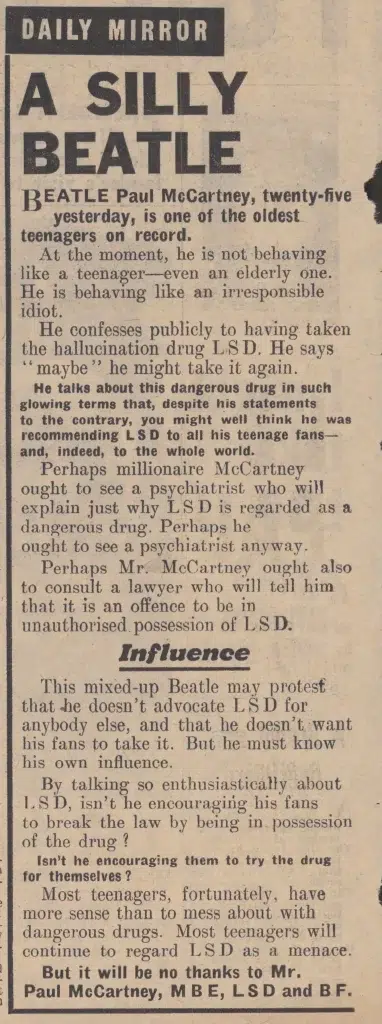
Fans press forward to pass birthday presents to Paul, pictured through the green-tinted windscreen of his car… and even just to touch his cheek. Picture by Mirror cameraman Alisdair MacDonald.
LSD AND ME – BY Paul McCartney
BEATLE Paul McCartney yesterday followed up his shock confession that he has taken the hallucination drug LSD by saying that it was possible that he might take it again. But Paul, twenty-five yesterday, said that his four experiences with the drug had such a deep effect that at the moment he does not feel the need for more.
He claims that LSD has made him believe in God, and has made it “very difficult” for him to tell a lie.
Paul, whose confession came at the weekend after the American magazine “Life” published a story that he had taken LSD “trips,” added: “I don’t regret that I’ve spoken out. I hope my fans will understand.”
But Paul’s disclosure shocked some of the fans who had gone to his mansion home in St. John’s Wood, London, to wish him a happy birthday.
June Wedge, 15, said: “Now the only present I have for him is to tell him off — but I’ll probably cry.”
Twenty girls surged round Paul’s green Aston Martin as he left for a rehearsal in a New Oxford-Street studio.
Paul told me at the studio: “I want to make this clear. I am not asking my fans to take it.” Earlier, Paul told me that LSD had made him see God. During the experience, he said, he “remained a Beatle.”
A Home Office spokesman said last night that it is not an offence to admit taking LSD. The offence is to be in unauthorised possession of the drug.
A psychiatrist who has studied the effects of LSD said yesterday: “Any factor that will encourage young people to seek this drug out — such, as a pop star’s involvement — is a potential menace.”
The drug can lead to insanity, and it may harm unborn children.
From Daily Mirror – June 19, 1967
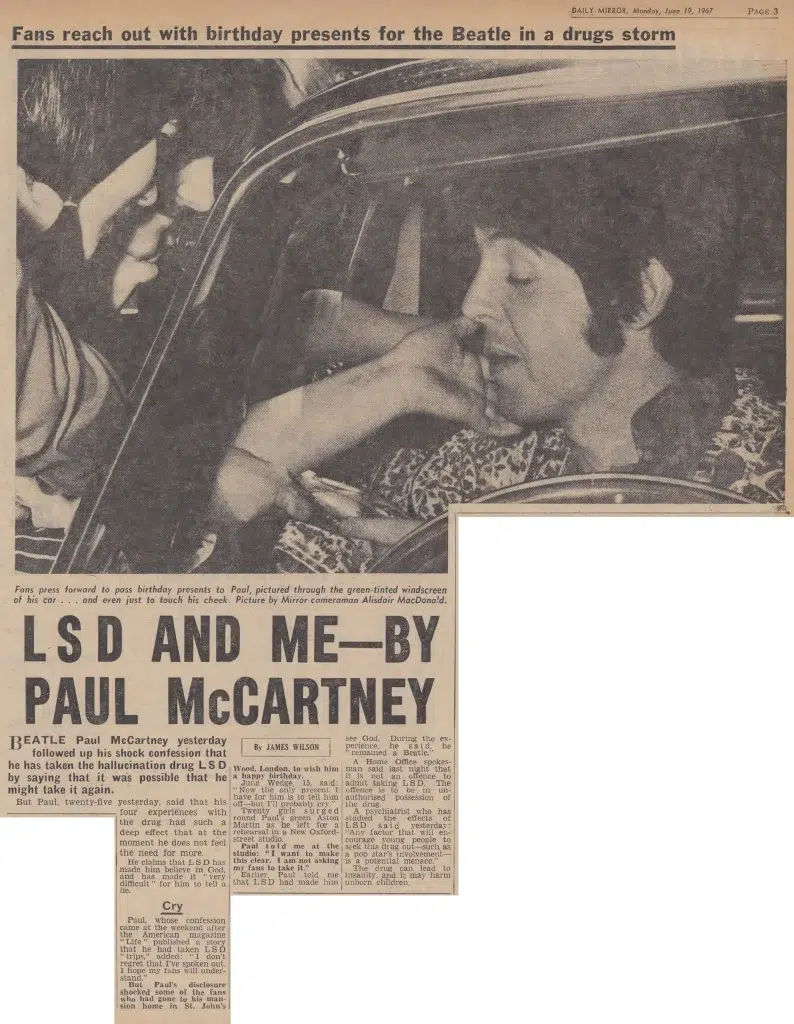
BEATLE PAUL: I ADMIT DANGER OF LSD
PAUL McCARTNEY, the Beatle in the centre of a storm since he admitted taking the “heaven and hell’ drug LSD, told me last night: “I admit there are dangers in taking it.“
Then he added: “But I took it with a deliberate purpose in mind: To find the answer to what life is all about.”
Paul had invited me to his home in St. John’s Wood London, after reading yesterday’s Daily Mirror editorial, which called him a B F and advised him to see a psychiatrist.
He said : “I won’t agree that I’ve swayed kids into taking LSD. Kids do what they want to do — always. They may follow us and grow a moustache, wear our kind of clothes — but they make their own decisions on personal things. Do all of Cliff Richard’s fans go around believing in God? No. When it gets down to personal issues we all make our own decisions.”
Paul said that he felt sorry for those who called him a bloody fool, “because I know I’m not.”
He added: “As for seeing a psychiatrist — that’s nonsense. They admit they only know 80 per cent, of the brain’s function. So they can only give you a 20 per cent, answer to your questions.”
The 25-year-old bachelor Beatle, dressed in a floral silk shirt and cherry red trousers, went on: “It’s not up to me to give the answer to LSD. I admit the dangers in taking it. But if you were to describe an aspirin as a ‘heaven and hell’ aspirin it would immediately fill you with horror… Unless you found out for yourself.” He felt angry because his confession has been interpreted as irresponsible.
“It was a personal thing,” he said, “taken in a personal sense in my own personal home. I did not interfere with anyone else. Neither would I. And I feel I have been far more rational and sensible than anyone who calls me a bloody fool. If the human being is denied the right to think for himself then we are all going to land up in a society of nowhere men. If anything I’ve said is irresponsible then the Daily Mirror or any newspaper that prints it is acting with equal irresponsibility. I have been condemned for telling the truth. I wanted to keep quiet, but I was asked, and I told the truth rather than lie. And when I said ‘Maybe I will take LSD again’ — I don’t know whether I will or not. I can’t predict what is going to happen in the future.”
From Daily Mirror – June 20, 1967
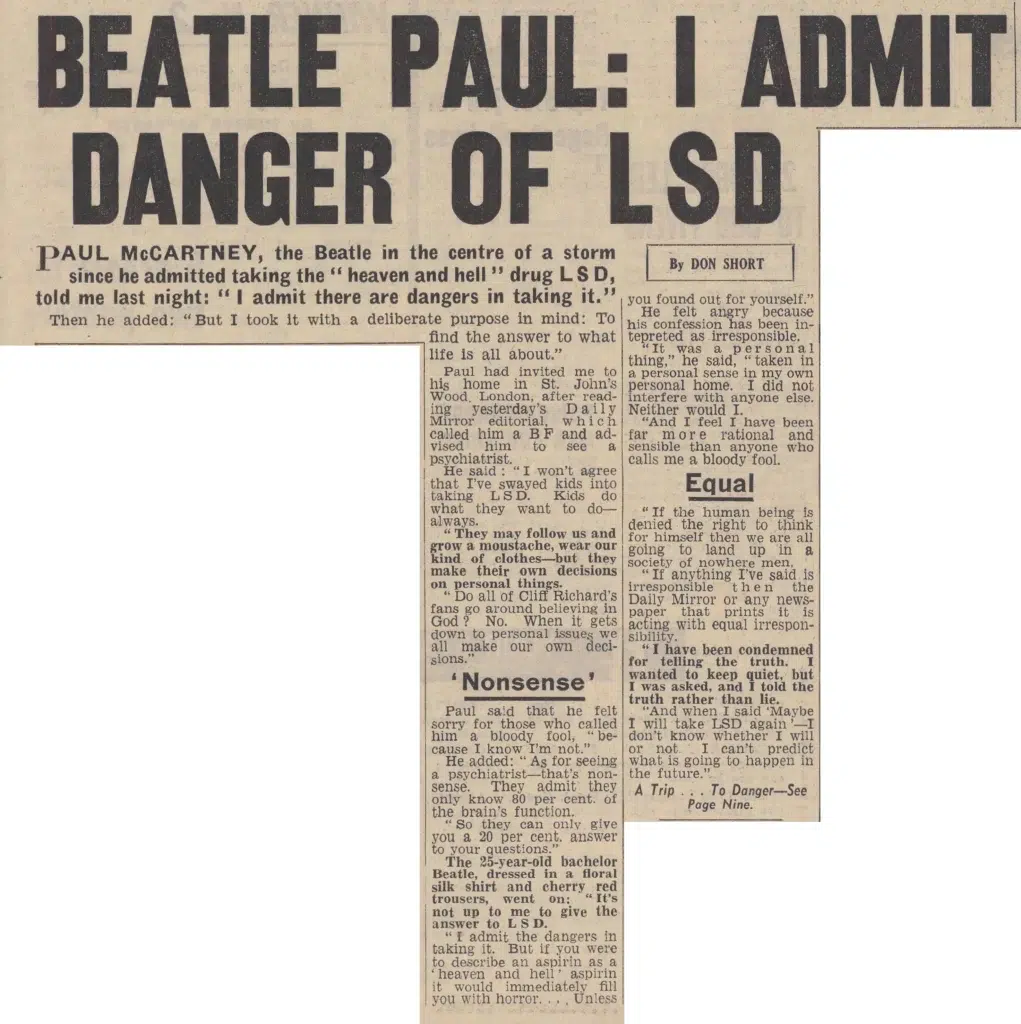
NOW OTHER BEATLES SAY: WE’VE TAKEN LSD
OTHER Beatles — not only Paul McCartney — have taken the “heaven and hell” drug LSD, it was revealed yesterday.
In one experiment a group of them took LSD together said George Harrison. John Lennon and George make it clear they have the same attitude to the drug as Paul, who is already under heavy criticism since his confession last week about taking LSD. They say they realise its dangers and their experiment was purely to try to find out how life’s problems can be solved.
Of their joint experiment with the drug George said yesterday: “It happened about a year ago, before using LSD was made illegal in this country. But I’m not saying that as an excuse as it could have happened now.”
Said John: “We were not taking it for kicks, but we were trying to find out about its potential for ourselves. I’m not saying what happened when we were under its influence — that defeats our object in taking it.”
The Beatles’ manager, Brian Epstein, who admitted going on five LSD “trips,” is convinced the drug can help solve humanitarian problems. But Epstein strongly warns of its dangers, and says it can only be taken if the circumstances are right. “One experiment of the five was horrific,” he recalls.
He added: “I don’t think I shall ever be taking it again.“
From Sunday Mirror – June 25, 1967
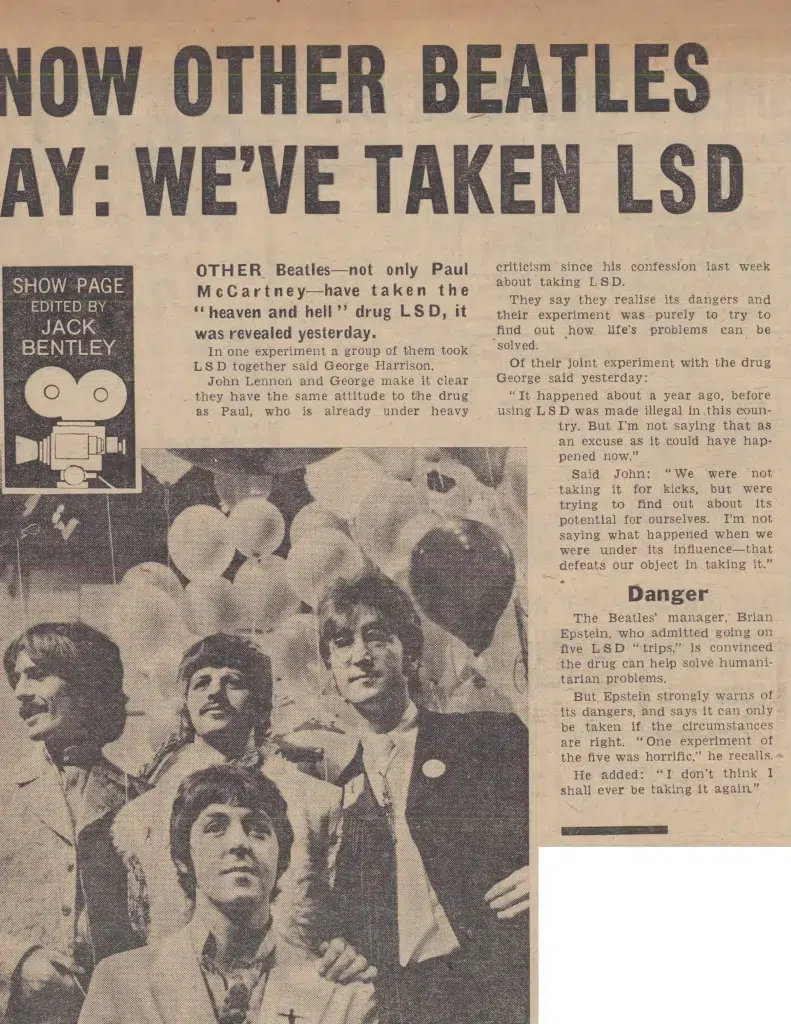
BEATLE PAUL AND LSD – WAS HE RIGHT TO OWN UP?
PAUL McCARTNEY’S public, and unrepentant, announcement that he has taken LSD, has produced the expected punditising in the press, on radio and TV.
In question are the wisdom of Paul’s revelations and whether they could influence others to follow his example. There has also been much theorising on the extent to which LSD has been accepted by Britain’s hip generation.
The MM Opinion Poll interviewed 100 youngsters throughout Britain on the subject. We put four questions to them: 1. Was Paul right to admit publicly that he had taken LSD? 2. Could Paul’s admission influence you to try LSD? 3. Should the use of LSD be legal or illegal? 4. Do you know anybody who takes, or has taken, LSD?
In answer to Question 1, 57 said Paul was wrong to admit he had taken LSD, 37 thought he was right, three were uncertain and three didn’t believe his admission and felt it was all a publicity stunt.
Some of those who felt Paul was wrong were pretty forthright. “Whatever possessed him to do it baffles me,” said 19-year-old Tom Key, of Ambergate, near Helper, Derbyshire. “The fact that he went rambling on about God convinces me that LSD pickles the brain.” “I’m sure he didn’t intend to colour kids’ minds with his story of divine solace — but it could have that effect,” said Sue Ball (19), of Derby. “If just one little moddie is tempted to touch LSD, or any drug, because of what McCartney said, then it was wrong. If he wanted to get close to God why didn’t he move in with John Lennon?”
Said Jim Gilbeany (19), of Edinburgh: “Paul’s old enough to know what he’s doing — and that’s what makes his confession frightening. I’m convinced he now regrets what he said. I know I’m sorry for him.” Patrick Tennent (19), of Clifton, Bristol, felt it might be “a bit of exhibitionism” while Barbara Slater (20), of Handsworth, Birmingham, said it had “ruined Paul’s, up until now, good image. It could be detrimental to his future career.”
Some, like Marion Shergold (13), from Southsea, could see no reason for Paul to lie when asked about LSD. Margaret Anderson (18), of Newcastle, thought his admission “showed moral courage.“
The answers to Question 2 should confound the prophets of doom — 96 out of our 100 youngsters were certain they couldn’t be influenced to try LSD themselves.
Two were not quite certain about it and two (both from Liverpool) said they might try it if offered as a result of Paul’s admission. Some of the 96 emulated their elders — those who feel others might be perverted by TV or films while denying that they could be themselves — and felt Paul might influence impressionable fans.
Alan Storey (18), of Middleton, Manchester, felt Paul could only influence “nut cases,” but Jean Wood (19), of Mottram, Cheshire, believes “teenagers who follow the Beatles’ ideas might be influenced.”
Thomas Murphy (19), of Glasgow, adopted a tough line: “I don’t believe that fans try to imitate pop stars who take drugs. Paul McCartney has ruined himself in the eyes of millions of people by showing that he is really a weak character who can’t live with reality without looking for an artificial way to escape.”
In reply to Question Three, there was overwhelming belief that LSD should be illegal — 76 out of the 100, with 18 disagreeing and six uncertain.
The suspicions of some newspaper columnists that there is an aura of glamour about drugs for teenagers were certainly allayed.
Phrases like “an evil which should be banned” and “all drugs are a canker” were frequently used. Kathy Reid (19), of Edinburgh, felt that drugs should be punished. Some, like Simon Leeman (20), of Bristol, made the point that little is known as yet, about any side effects from LSD.
Most of those who did not think the drug should be illegal explained that this was not because they were particularly in favour of LSD.
Said Rita Wickett (20), of Handsworth, Birmingham: “It is of value in medical research and even if it was illegal it wouldn’t stop addicts taking it—they’d obtain some somehow.”
“You cannot legislate for the idiots of the world,” was the view of Jack Potter (16), of Leigh Park, Hampshire. “More people would want to try it just because it was banned,” was the somewhat cynical reaction of Barry Waddilove (19), of Hyde, Cheshire.
Despite the Sunday papers, LSD users are hardly lurking in every coffee bar, according to the answers we got to Question Four which asked if our subjects knew anyone who used the drug. Of our 100 youngsters, 89 did not know of anybody. Four were uncertain and seven said they did know users.
The uncertains, incidentally, were those who knew people who claimed that they had used LSD but did not believe them. “I knew somebody who said he had taken it and even described ‘trips’,” reported Raymond Vaughan (16), of Splott, Cardiff. “But he was a bit of a nut anyway so he could have been making it up.”
Roger Smith (18), of Derby, voiced a popular view with: “I doubt if more than a few people in this country use it. It’s probably been grossly over-exposed in the papers.” Said John Glancy (15), of Edinburgh: “I’ve never heard of anyone in Scotland who takes it.”
“Take LSD?” retorted Sheila Kiddle (21), of Portsmouth. “Of course not. My friends are all sane.”
To sum up: the vast majority of Britain’s teenagers believe that LSD is evil and that Paul McCartney was wrong to admit he had taken it.
And they have no intention of trying it for themselves. They’ve got too much bloody sense.
From Melody Maker – July 1, 1967
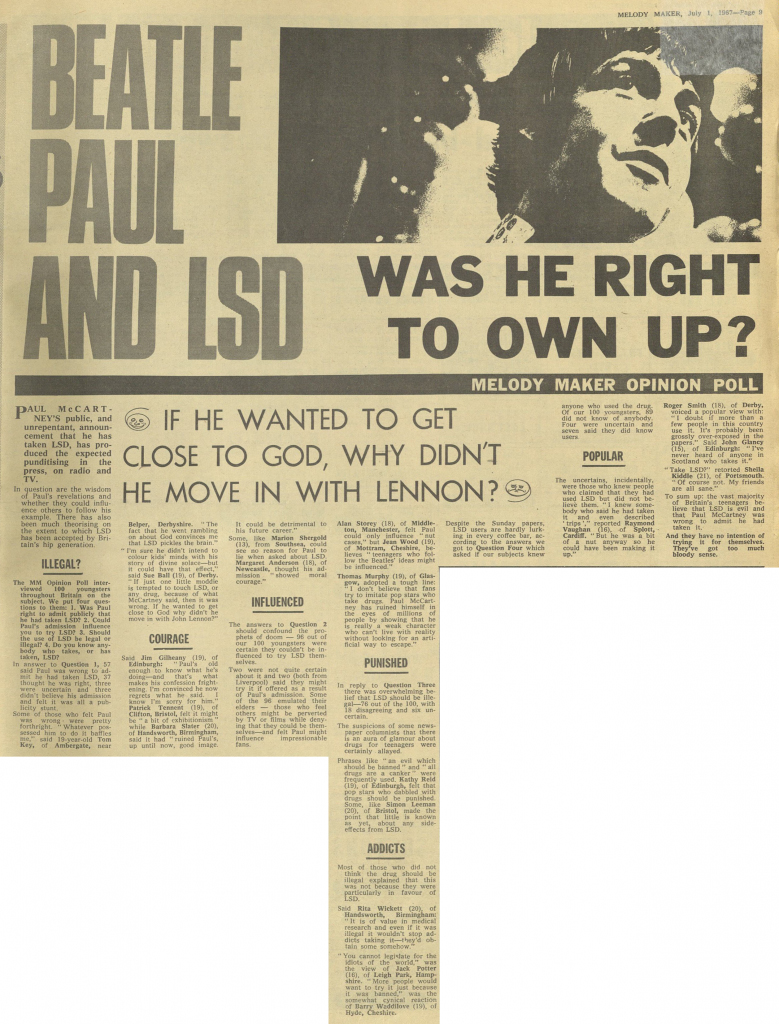
PAUL’S T.V. STATEMENT
A couple of weeks ago widespread headlines and front-page stories in Britain’s Sunday newspapers drew attention to part of an interview given by Paul to America’s Life magazine. In the course of this interview Paul had answered honestly a straight question directed to him on the subject of taking the drug LSD. When the newspaper men tackled him in an attempt to draw further comment on the topic Paul was very careful to make it plain that his experience of the drug had been a very personal thing and he was anxious to avoid all possibility of other people experimenting.
On the evening of Monday, June 19, 36 hours after the press had reported and examined the original Life magazine statement, Independent Television News sent an interviewer to Paul’s home in St. John’s Wood where they filmed a follow-up conversation in which the Beatle further clarified his feelings. The film was screened throughout the UK via Independent Television at nine o’clock the same evening.
In view of the importance of this further statement THE BEATLES MONTHLY BOOK prints below a complete verbatim transcript of the television interview.
REPORTER: Paul, how often have you taken LSD?
PAUL: Er, four times.
REPORTER: And where did you get it from?
PAUL: Well, you know, I mean, if I was to say where I got it from, you know, it’s illegal and everything, it’s silly to say that so I’d rather not say it.
REPORTER: Don’t you believe that this was a matter which you should have kept private?
PAUL: Well, the thing is, you know, that I was asked a question by a newspaper and the decision was whether to tell a lie or to tell the truth, you know. I decided to tell him the truth but I really didn’t want to say anything because if I’d had my way I wouldn’t have told anyone because I’m not trying to spread the word about this but the man from the newspaper is the man from the mass medium. I’ll keep it a personal thing if he does too, you know, if he keeps it quiet. But he wanted to spread it so it’s his responsibility for spreading it. Not mine.
REPORTER: But you’re a public figure and you said it in the first place. You must have known that it would make the newspapers.
PAUL: Yes, but to say it, you know, is only to tell the truth. I’m telling the truth. I don’t know what everyone is so angry about.
REPORTER: Well, do you think you have encouraged your fans to take drugs?
PAUL: I DON’T THINK IT WILL MAKE ANY DIFFERENCE. YOU KNOW, I DON’T THINK MY FANS ARE GOING TO TAKE DRUGS JUST BECAUSE I DID. BUT THE THING IS THAT’S NOT THE POINT ANYWAY. I WAS ASKED WHETHER I HAD OR NOT AND FROM THEN ON THE WHOLE BIT ABOUT HOW FAR IT’S GOING TO GO AND HOW MANY PEOPLE IT’S GOING TO ENCOURAGE IS UP TO THE NEWSPAPERS AND UP TO YOU, YOU KNOW, ON TELEVISION. I MEAN YOU’RE SPREADING THIS NOW AT THIS MOMENT. THIS IS GOING INTO ALL THE HOMES IN BRITAIN AND I’D RATHER IT DIDN’T, YOU KNOW. BUT YOU’RE ASKING ME THE QUESTION AND IF YOU WANT ME TO BE HONEST I’LL BE HONEST.
REPORTER: But as a public figure, surely you’ve got a responsibility to not say any…
PAUL: No, it’s you’ve got the responsibility. You’ve got the responsibility not to spread this now. You know I’m quite prepared to keep it as a very personal thing if you will too. If you’ll shut up about it I will!
A few hours before the ITN newscast Paul repeated his desire to emphasise the point that the last thing he wanted was to encourage or even condone the taking of LSD amongst Beatles’ fans or anyone else. He said he did not under any circumstances wish to advocate the use of the drug for anyone else and he hoped people would understand this.
From The Beatles Monthly Book, July 1967
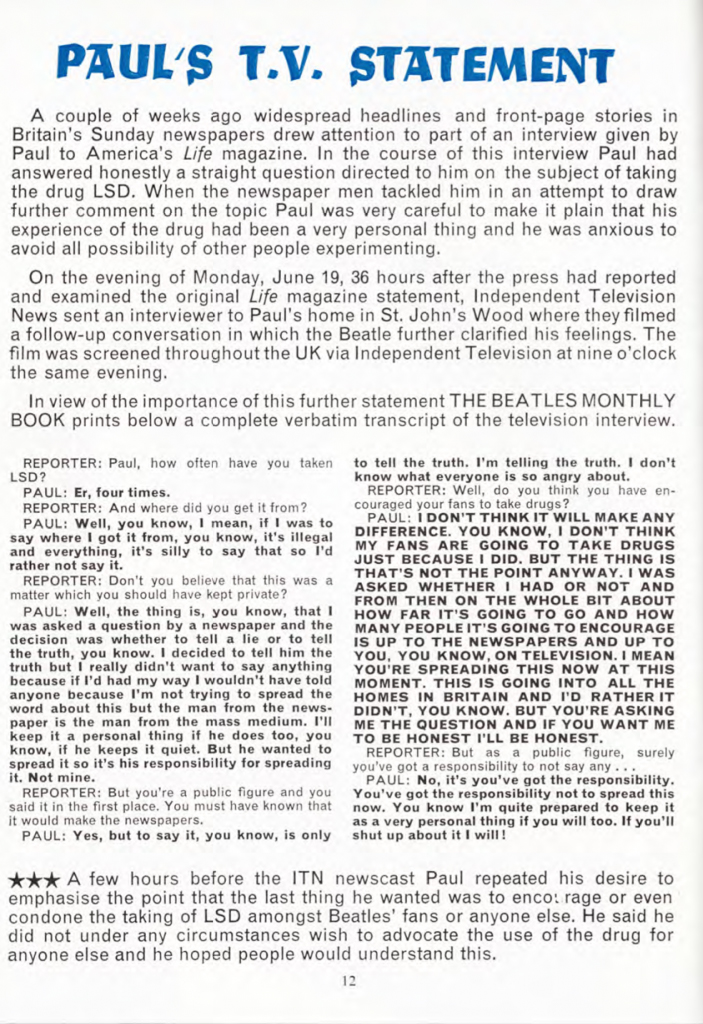
DRUGS: MINISTER SLAMS PAUL McCARTNEY
In an outspoken attack on drug taking by the young, Miss Alice Bacon, Minister of State at the Home Office, told the Commons today she had been “horrified” to read the views of well-known people on drugs, including Paul McCartney of the Beatles.
Miss Bacon said she was not normally a reader of The Queen magazine, but a copy was passed to her yesterday at the hairdresser’s to while away the time when she was under a drier.
There was a long article in it called The Love Generation, and statements from various people, pop singers and managers of pop groups.
Miss Bacon said Paul McCartney was reported to have said: “God is in everything. God is in the space between us. God is in the table in front of you. It just happens I realise all this through weed. It could have been through anything else.”
Miss Bacon added that the Beatles’ manager had also been in favour of hallucinatory drugs.
“The only person with any sense seems to be the little pop singer Lulu.” She had said that people were talking about love, love, love, and thought you had to have drugs to be part of this.
Lulu had said: “Love is far older than pop and goes right back to Jesus. I am a believer.”
Miss Bacon said that the young people took seriously what was said by these pop stars. She went on: “What sort of society are we to create if everyone wants to escape from reality into a dream world of this kind? There are those who see in society’s attitude to drug-taking an opportunity for questioning traditional values and social judgments of all kinds.
“For some young people drug taking is a way of life — the way of life — to which they beckon the impressionable, the curious, frustrated and demoralised. Insidiously or openly, unwittingly or wittingly, the young are being taught the paraphernalia of psychedelic experience and the catch phrases of the drug cult. This seems to be the real challenge of ‘soft drugs’ and it is growing.
“The Government believes it is time for responsible influences to check this trend. It is time to make it clear that teenage drug-taking is ill-advised, if not dangerous, to personality and health. It is time to rebut the claims of those who profess to make mystics out of the immature.”
Miss Bacon said drug-taking among the young was a challenge to all sections of society and the Government intended to play its part in combating it. Mr. William Deedes (C, Ashford), a former Under-Secretary at the Home Office, said the Government would be “totally irresponsible” to release cannabis from control. “It would be mad to release this drug from control,” he said. Miss Bacon agreed that such a thing would be “entirely mad,” although the Government was bound not to by international agreements.
Among young people there was a real danger that the experimenter would become addicted. One in five of young people admitted to remand homes and detention centres had a record of drug-taking. Miss Bacon warned that 1967 would show an increase in con-fictions for drugs. Prosecutions for misuse of drugs in 1966 totalled 1216. But in the first four months of this year prosecutions totalled 721. “It looks as if there is going to be a very great increase,” she said. Miss Bacon said cannabis convictions last year totalled 1119. In the first four months of this year the total was 530, so again, an increase was likely.
The Government recognised the controversy about the dangers of cannabis. It had become extensive only recently in the Western world and opinions were divided about its dangers. Its potency varied according to where it was produced and the personality of the user.
The Government’s advisory committee on drug dependence had set up a special subcommittee on LSD and cannabis. Its members represented a wide spectrum of opinion and one of them had signed Monday’s advertisement in The Times urging for control to be lifted from cannabis.
Miss Bacon said there was an urgent inquiry being undertaken on the drug STP, which had not yet been brought under control in America.
The texture of this drug did not automatically bring it within the scope of the 1964 Misuse of Drugs Act. The Government chemist was examining a single tablet sent to the Home Office last week.
Mr. Tom Driberg (Lab., Barking), who said he was one of only two MPs who signed The Times advertisement, said an expert doctor had expressed the opinion to him that only 12 to 15 per cent of the hard drug addicts who came for treatment for heroin addiction had started on cannabis.
“One point that may be said about the escalation is that the underworld pushers of these drugs sell both the softer drug, cannabis, and the harder one, heroin, and they are naturally anxious to get their victims on to the harder ones which are addictive and more lucrative to them. These are the people I hope the Home Office will drive out of business. It is very easy always to blame drugs for outbreaks of violence, for various evils in society, the root causes of which have not been sufficiently analysed or determined.”
A proposal that the Home Office sub-committee examining the question of soft drugs should hold its inquiry in public to convince young people of the truth of their findings was made by Mr. Paul Channon (Tory, Southend West).
He said there was “abundant evidence” that there had been a vast increase in the use of drugs of all kinds in Britain during the past few years. Mr. Channon feared that large numbers of respectable, intelligent young people were taking the drug. Repression would not be enough. They had to be convinced as well.
“I do not ask for cannabis to be legalised. I want the evidence to be obtained on which a balanced judgment can be formed. People must be convinced at the end of the day one way or the other.”
Replying to Mr. Channon, Miss Bacon said it would be inappropriate for the committee considering LSD and cannabis to be open to the public.
From Evening Standard – July 28, 1967
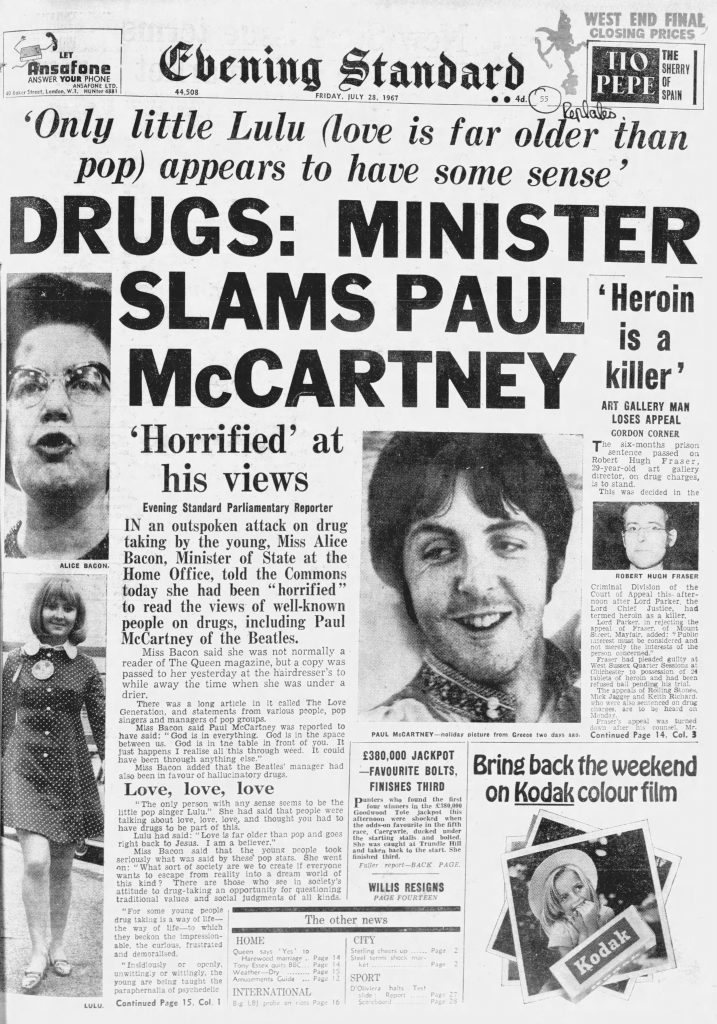

DRUGS: MINISTER RAPS A BEATLE
BEATLE Paul McCartney was slated, and pop star Lulu praised, in an outspoken attack by a woman Minister yesterday on the taking of “soft” drugs by young people. Miss Alice Bacon, Minister of State at the Home Office, was replying to a Commons debate on the increase in drug taking. And Miss Bacon told of her shock when she was given “The Queen” magazine to read at her hairdressers. There was an article in it called The Love Generation, and statements from various pop singers and managers of pop groups. “I must say I was horrified by some of the things I read,” said Miss Bacon.
Paul McCartney was reported to have said that God was in everything and he had realised this from the drug LSD. The Beatles’ manager had also been in favour of hallucinatory drugs, said Miss Bacon. “The only person with any sense seems to be the little pop singer Lulu,” she added.
Lulu was quoted as saying that people were talking about love, love, love, and thought you had to have drugs to be part of this. But Lulu’s comment to this was: “Love is far older than pop, and goes right hack to Jesus. I am a believer.”
Miss Bacon went on: “Our young people do take what some of these pop stars say quite seriously. What sort of society are we going to create if everyone wants to escape from reality into a dream world?”
She went on: “Today there are those who see in society’s attitude to drug taking the opportunity for questioning traditional values and social judgments of all kinds. Insidiously or openly, unwittingly or wittingly, the young are being taught the paraphernalia of psychedelic experience, and the catch-phrases of the drug cult. This seems to be the real challenge of soft drugs, and it is growing. The Government believes it is time for responsible influence to check this trend. It is time to make clear that teenage drug-taking is ill-advised, if not dangerous, to personality and health,” she said.
“This is the challenge which all sections of society must take up. and the Government is resolved to do its part.”
From Daily Mirror – July 29, 1967
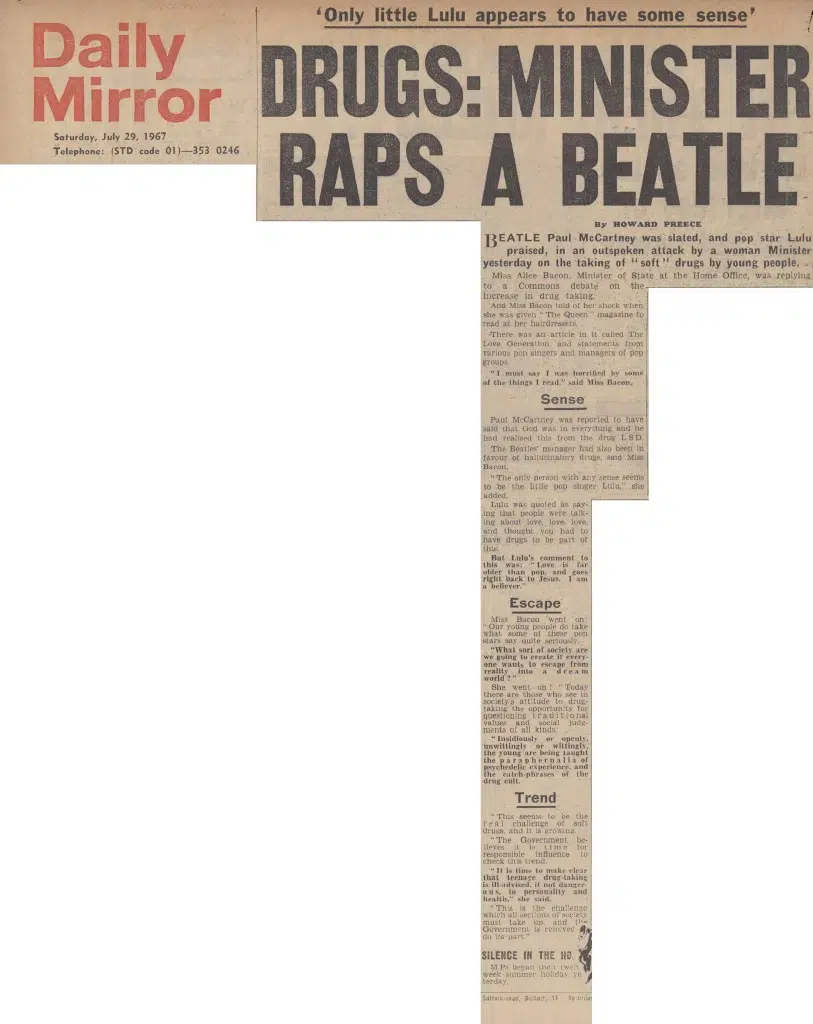
EPSTEIN DEFENDS ‘POP’ AGAINST DRUGS ATTACK – MISS BACON ‘PREJUDICED’
MR. BRIAN EPSTEIN, the Beatles’ manager, replied last night to an attack in the Commons by Miss Alice Bacon, Minister of State, Home Office, on pop stars who publicly extol the cult of “soft” drug taking. [Commons report—P16.]
“Miss Bacon’s remarks seem to be extremely prejudiced, and singularly ill-informed,” said Mr. Epstein. “The whole thing has been ridiculously sensationalised. Cannabis is not the most important thing in the world. What is good is that the conflict of opinion on the smoking of pot has been brought out into the open. It is not merely a conflict between the young and the old. My opinion is that pot smirking is definitely less harmful than drinking alcohol. A man is much more a danger to society if he is drunk on alcohol than if he is ‘high’ on pot. I am not addicted to either, but I have been very drunk and very ‘high.’”
REPLY TO DEBATE – Effect on young
Miss Bacon, replying to a debate on the use of “soft” drugs by young people, said that young people were inclined to take quite seriously what some pop stars said.
“It is time to rebut the claims of those who profess to make mystics out of the immature. This is the challenge which all sections of society must take up and the Government is resolved to do its part.”
Ninety-seven per cent of the heroin addicts known to the Home Office had a previous history of cannabis taking.
Miss Bacon had been horrified by an article in the magazine Queen. There were statements from various people who were pop singers and managers of pop groups. For instance. Paul McCartney, of the Beatles, had said that God was in everything, and he had realised this through the use of LSD.
“The only person with any sense seems to be the little pop singer Lulu.” She had said that people were talking about love, love, love, and thought you had to have drugs to be part of this. Lulu had said: “Love is far older than pop and goes back to Jesus. I am a believer.”
“What sort of society are we going to create if everyone wants to escape into a dream world through drugs?” Miss Bacon demanded. “For some young people drug-taking is a way of life to which they beckon the impressionable, the curious, the frustrated and the demoralised.”
CATCH PHRASES – “Drug cult”
Miss Bacon said that an urgent inquiry was being made into a new drug STP, whose texture did not automatically bring it into the scope of the 1964 Act. The Government chemist was examining a single tablet sent to the Home Office last week.
Answering Miss Bacon’s charge that the young were being taught “the paraphernalia of psychedelic experience and catch phrases of the drug cult.” Mr. Epstein I replied: “I think in 15 or 20 years time, this whole matter will be looked back on as we now look on the misfortunes of a homosexual a few years ago.”
The idea that people who used soft drugs proceeded to hard drugs was “utter nonsense.” It was becoming fairly widely known that the dangers of marijuana were small, and it was ridiculous to send people to prison for using something less harmful than alcohol.
Jonathan King, pop singer and Cambridge graduate, was one who disagreed. He thought that some teenagers might be influenced.
Manfred Mann, the pop star, who recently wrote to a newspaper suggesting that marijuana might be legalised, said: ”I think drug taking is more likely to be a way of life while it is illegal.
“If it were legalised all the mystique would go. There is not much mystique in smoking a cigarette.”
Lulu, 18, the Glasgow-born singer, whose real name is Marie Lawrie, said on the ITV News at Ten last night that she had never taken drugs. “I have never had any inclination to try anything like that. You can never be sure of them as you are of yourself.”
She considered pop stars like herself had a responsibility to the public, and believed a lot of people in the profession took drugs. “I have never sat around watching them but they have admitted it.”
From The Daily Telegraph – July 29, 1967
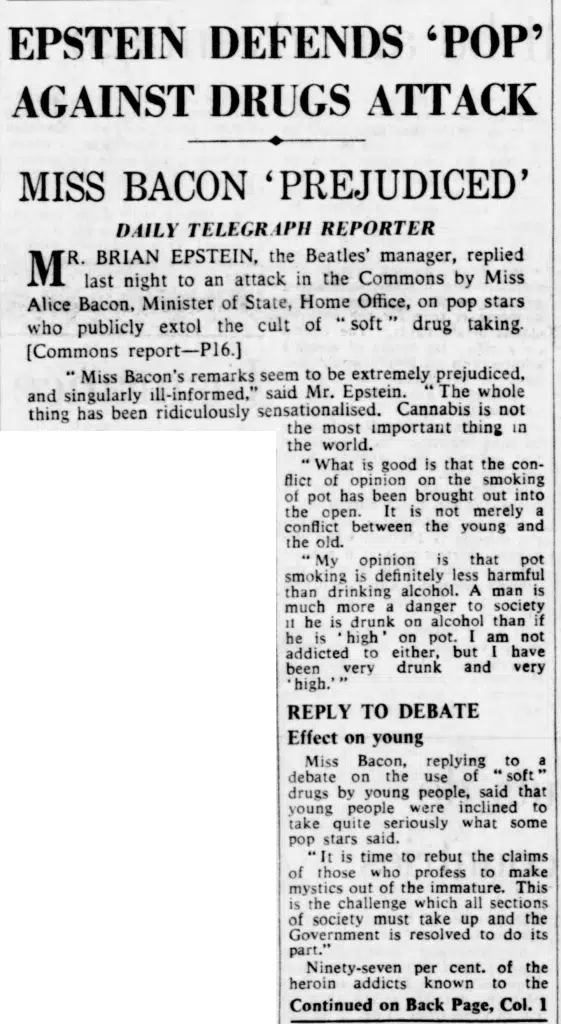
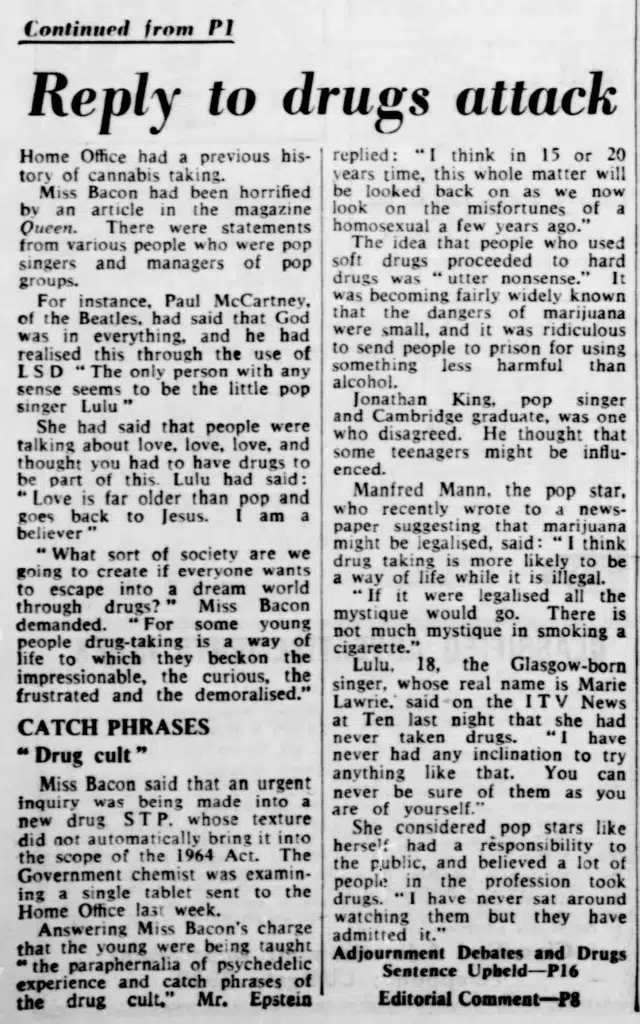
MISQUOTED ON DRUG-TAKING, SAYS BEATLE
Paul McCartney, of the Beatles pop group, said yesterday that Miss Bacon, Minister of State. Home Office, was misinformed when she quoted him last week during a Parliamentary attack on drug taking by young people.
McCartney, who returned to London yesterday from a holiday in Greece, said: “I’m always being misquoted. I never really said anything as controversial as it sounded.”
Commenting on the outcome of the appeal by Rolling Stones Mick Jagger and Keith Richard, McCartney said: “I’m always pleased about the idea of people not going to gaol.”
From The Daily Telegraph – August 1, 1967

STILL NOT UNDERSTOOD, SAYS BEATLE PAUL
Beatle Paul McCartney and Jane Asher are seen with Julian Lennon, four-year-old son of Beatle John Lennon, on their arrival at London Airport from Athens yesterday, where they had been on holiday.
Asked about the speech by Miss Alice Bacon, Minister of State at the Home Office, on pop stars and drug-taking, McCartney commented: “It was OK. — What can you say about it? I think she was misinformed. They are always trying to put the younger generation down,” he added. “I still don’t feel that anyone really understands it.”
Commenting on the outcome of the appeal of Rolling Stones Mick Jagger and Keith Richard, he said: “I am always pleased about the idea of people not going to gaol.”
From Liverpool Daily Post – August 1, 1967
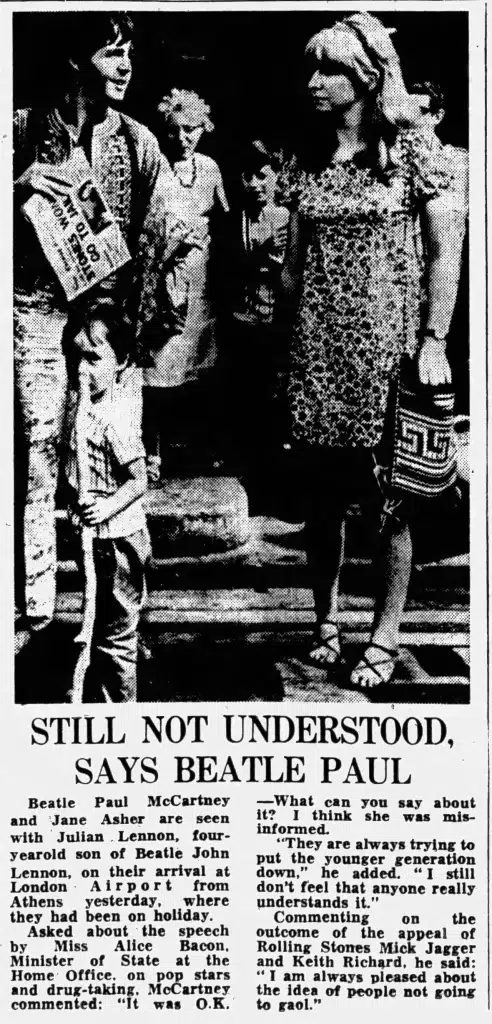
The Beatles Diary Volume 1: The Beatles Years
"With greatly expanded text, this is the most revealing and frank personal 30-year chronicle of the group ever written. Insider Barry Miles covers the Beatles story from childhood to the break-up of the group."
We owe a lot to Barry Miles for the creation of those pages, but you really have to buy this book to get all the details - a day to day chronology of what happened to the four Beatles during the Beatles years!
If we modestly consider the Paul McCartney Project to be the premier online resource for all things Paul McCartney, it is undeniable that The Beatles Bible stands as the definitive online site dedicated to the Beatles. While there is some overlap in content between the two sites, they differ significantly in their approach.

Notice any inaccuracies on this page? Have additional insights or ideas for new content? Or just want to share your thoughts? We value your feedback! Please use the form below to get in touch with us.